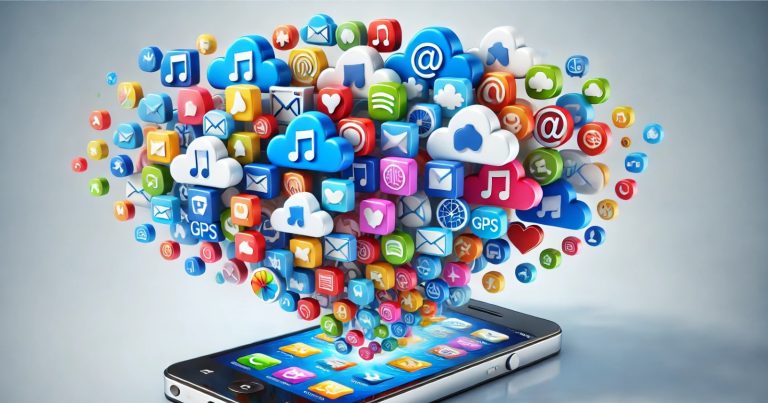Mobile technology uses portable devices and wireless systems that enable individuals to remain connected, browse the internet, and operate various applications from any location. It involves mobile phones, tablets, laptops, wearable devices and the networks that power them. From speech and text communication to banking, education, shopping, and remote work, mobile tech has become part of our everyday lives. It is still evolving quickly, enabling chores or bringing firms to our fingertips.
What is Mobile Technology?
Mobile technology consists of devices that distribute a wireless signal, such as phones, tablets, laptops, etc. This method of operation allows users to roam freely while still maintaining a connection to a network or the internet.
In the current digital landscape, mobile technology is the bedrock of how people communicate, learn, shop, and even handle their health and finances. Mobile technology added significant value and provided us with virtual access to information or entertainment 24/7 wherever we travel. Indeed, mobile tech use is ubiquitous across every age group and social strata; millennials are more likely than older generations to use their phones for everything from work emails to socializing with friends.
Uses of Mobile Technology
Various fields of daily life use mobile technology, and the world is faster, easier, and more efficient. From discussing with friends to managing a business, it plays a significant part in all the domains. Mobile technology: connecting to services and opportunities from anywhere. This technology benefits everyone, from villages to towns to cities.
Communication
With the arrival of mobile phones, the convenience of the internet has been revolutionising how people communicate. People stay in touch with family, friends and colleagues through voice calls, video calls, messaging apps and emails. Apps such as WhatsApp, Instagram, and Facebook allow people to share pictures, updates and videos instantly. These tools allow you to stay connected at any time, from anywhere.
Education
Technology has eased the way to learn. Gone are the days when students depended entirely on tuition classes and school lectures. Additionally, they can read eBooks, attend live classes, and take online exams. Most agree that digital education helps students to study at home and to gain proper knowledge without the need to visit educational institutions.
Business and Work
Most people today use digital tools to work from home. Applications such as Zoom, Microsoft Teams and Slack enable teams to communicate and hold meetings on the internet. So do mobile banking, cloud-based storage, and business tools that allow companies to manage work from anywhere. These technologies save time, reduce travel, and allow business to be conducted seamlessly.
Entertainment
Digital technology brings many different forms of entertainment. Whether it is listening to music on Spotify or watching movies on Netflix or YouTube, or mobile gaming, people do whenever they want. How CDs and DVDs were replaced with online streaming and how home entertainment became quick and easy. At home or on the go, digital tools also thing to help you enjoy yourself.
Healthcare
Technology has improved healthcare access and services. Telemedicine apps are used by people to speak with doctors online and schedule appointments without going to hospitals. Health-tracking apps and wearables measure heart rate, steps and sleep. These tools allow users to remain healthy, check in on their fitness goals, and even seek medical attention without leaving their homes.
Types of Mobile Technology
Mobile technology has a variety of types, each with its own use and feature. These kinds have transformed how we live and work. Such mobile technology enables users to achieve tasks conveniently without being restricted to a specific location.
SMS
SMS, Short Message Service It also enables users to send and receive text messages through mobile devices. People send SMS to pass on minute details without accessing the internet. It works inside all phones and remains common for alerts, bank messages, and one-time passwords (OTPs). SMS is short, quick, and dependable (in terms of delivery).
MMS
MMS stands for Multimedia Messaging Service. It lets users send photos, videos and audio files over mobile networks. Unlike SMS, which only transmits text, MMS permits the sharing of rich media. People use it to share greetings, pictures or small video clips. It also works even when the phone has no internet.
4G
4G means the fourth generation of mobile networks. It provides users with fast internet on their phones. With 4G, people can watch videos, browse a website, and use social media much more quickly than on older networks, getting better call clarity and download speeds. Most smartphones today are 4G-enabled for full online usability.
5G
5G is the fifth generation of mobile telephony and the successor to 4G LTE. Wireless technology is an international standard by the 3rd Generation Partnership Project (3GPP) that was finalized in December 2017 and will be officially released in June 2019. Essentially, 5G aims to enable high-speed, low-latency data connections in a crowded environment with thousands of users on the same network at once, with little to no slowdown or dropouts.
GSM
GSM: Global System for Mobile Communications However, it is one of the most widely used mobile network standards. This specific tech enables individuals to utilize cellular mobile phones (calls and SMS texts) along with the utilization of mobile internet. But GSM is the standard used by the majority of phones in the world. That also makes it easy to move SIM cards between different phones.
CDMA
Short for Code Division Multiple Access, or just CDMA. It’s another kind of mobile network technology and is primarily used in the U.S. CDMA phones don’t use SIM cards like GSM phones do. It offers good call quality and data services, although users might find it more difficult to switch devices.
Wi-Fi
Wi-Fi enables a person to connect their phones, laptops and tablets to the internet without consuming mobile data. It works by using the wireless signals from routers. Often, users are connected to Wi-Fi in either home, schools, offices, or cafes. Wi-Fi saves mobile data and provides high speeds for downloading and streaming.
Advantages of Mobile Technology
Mobile technology advantages for users it replaces the most of the tedious processes we see in the life more comfortable, effective, and quick. In an age when life seems incomplete without mobile technology, its daily convenience becomes indispensable, particularly in India where mobile penetration is among the highest in the world.
- There are a wide variety of applications that we can use to stay connected with friends and family members whenever we want. These days, a mobile phone or mobile phone is all that we require to connect or do video visits with our family or friends. Otherwise, the portable keeps us updated on other news, including all of the rest of the world.
- Mobile phones of today have made our day to day life pretty smooth. Nowadays, one can check the status of traffic on their phone and make necessary arrangements to be on time. The weather is also a factor.
- The entire world of gaming is all under one roof thanks to the advancement of mobile technology. When we feel bored with boring work and to break, we can hear music, see a movie, see a series we like to hear a video from a song we like.
- Mobile phones are now used for many legitimate things such as meeting times, receiving and sending documents, to provide introductions, warning, job application etc. Cell phones have turned out to be a must-have device for every working personnel.
- Mobile phones these days are used as a wallet to make payments. Right now, utilities may be used to send money to friends, relatives and others.
Relevance to ACCA Syllabus
Mobile technology is an important element of the digitalization parts of both the Strategic Business Leader (SBL) and Audit and Assurance (AA) papers. Decision-making, communication, data sharing, and even internal controls can all be impacted by mobile solutions, according to ACCA. Accountants have apps for real-time reports, secure approvals, cloud-based accounting access, and performance tracking. Mobile tools are an important part of the how business is done today and where the workforce is heading.
Mobile Technology ACCA Questions
Q1: What are ways that mobile technology aids field auditors?
A) There are standards being replaced for audits
B) And as it provides live access to cloud based audit software
C) Generating financial statements
D) By limiting communication
Ans: B) Through real-time access to cloud-based audit software
Q2: What mobile function ensures approval of financial reports faster?
A) Offline browsing
B) Instant messaging only
C) Workflows and notifications for mobile app
D) File compression
Ans: C) Mobile app notifications, workflows
Q3: Which of the following ACCA subject has high emphasis on latest mobile-enabled communication develop management and strategic leadership?
A) Financial Management
B) Strategic Business Leader
C) Taxation
D) Performance Management
Ans: B) Strategic Business Leader
Q4: What are the advantages that mobile apps add to the internal control process?
A) By disabling alerts
B) Only store data offline
C) By allowing for real-time access, alerts and approvals
D) Loophole by avoiding document tracking
Ans: C) Access, alerts, and approvals on real-time basis
Q5: What is one risk associated with mobile use in accounting systems?
A) Physical theft only
B) Lack of internet
C) Cybersecurity vulnerabilities and data leakage
D) Increased depreciation charge for office assets
Ans: Cybersecurity threats and data leakage
Relevance to US CMA Syllabus
For instance, in the US CMA, Part 1: Financial Planning, Performance and Analytics, mobile technology is linked to how digital systems augment managerial decision-making. CMAs rely on mobile dashboards, analytics apps, or financial planning apps to provide critical data whenever they move. Variance analysis, project monitoring, and KPI tracking is also supported by mobile integration. Knowledge of mobile tools allows for CMAs to be responsive and data-informed in a quickly moving business space.
Mobile Technology CMA Questions
Q1: How do mobile business intelligence apps serve CMAs?
They cut out budgeting steps.
B) They facilitate access to your KPIs/ performance reports real time
C) They replace spreadsheets
D) They avoid planning
Ans: B) They enable access to real-time KPIs and performance reports
Q2: What kind of mobile solution is highest in utility for project expenses monitoring?
A) Calculator app
B) Music player
C) An expenses mobile app
D) Weather app
Ans: a) Expense tracker app for mobile
Q3: One mobile risk management issue for financial planners
A) Reduce brightness of your mobile screen
B) Multiple SIM card usage
C) Bad mobile encryption leading to data loss
D) No paper documentation
Ans: C) Data loss due to inadequate encryption on mobile devices
Q4: What about mobile technology enhances performance dashboards?
A) Smaller screen
B) Charts can also be generated manually
C) The ability to sync data in real-time, as well as push notifications.
D) Background music
Ans: C) Real-time data syncing and push notifications
Q5: Which section of CMA covers the use of mobile technologies in connection with financial analytics?
A) Ethics
B) Strategic Cost Management
C) Financial Planning, Performance and Analytics
D) Part 2: Decision Analysis
Ans: C) Financial Planning, Performance and Analytics
Relevance to CFA Syllabus
The CFA curriculum focuses heavily on how technology drives efficiency in finance, emphasising data collection and analysis, market analysis, and real-time portfolio management. The ability for analysts and portfolio managers to monitor trades, track markets, and receive alerts instantaneously on mobile technology. Similar to the Quantitative Methods, Ethics and Portfolio Management topics of all levels. Understanding mobile access tools enhances investment evaluations and client servicing proficiency in rapidly evolving financial markets.
Mobile Technology CFA Questions
Q1: What role do mobile apps play in improving the investment decision-making process?
A) Providing physical access to client portfolios
B) By delaying data updates
D) It is entitled with the power of Artificial Intelligence using machine learning.
D) By sending hard copy statements
Q: C) Offering real-time market data and alerts
Q2: Which area of CFA gets most benefit from risk tracking mobile enablement?
A) Derivatives Pricing
B) Portfolio Management
C) Ethics and Professional Standards
D) Accounting Methods
Ans: B) Portfolio Management
Q3: What is an enigmatic mobile feature available to professional investors?
A) Background display mode
B) Asset price movement push notifications
C) Flashlight tools
D) Voice recorders only
Ans: B) Notifications about price movement in assets
Q4: What mobile risk should CFA charterholders be aware of?
A) Real-time alerts
B) Increased processing speed
C) Unauthorised access or theft of financial data from devices
D) Easier client updates
Ans: C) Access to financial data in a device without authorization
Q5: How does the mobile access fall within CFA’s professional conduct standards?
A) prompts you to miscommunicate
B) Assists in furnishing precise information to clients in a timely manner
C) Creates unnecessary additional paperwork
D) Avoids responsibility
Ans: B) Assist in providing information to clients in a timely and accurate manner
Relevance to US CPA Syllabus
Mobile technology is part of the digital transformation of the accounting profession, and it is included in the AUD and BEC sections of the US CPA exam. CPAs utilise mobile apps to scan documents, tag receipts, perform remote auditing, and access financial information. Mobile connectivity improves efficiency as far as communication is concerned, which plays a crucial role for dispersed teams and cloud accounting systems. This also ensures audit quality as well as the protection of sensitive and important data.
Mobile Technology CPA Questions
Q1: Are CPAs using mobile devices in the new audit environment?
A) For paper document storage
B) To read live customer data stored on cloud-based services
C) For distributing tax returns
D) For printing journals
Ans: B) For retrieving up-to-date customer information from cloud platforms
Q2:Name a mobile tool that enables CPAs to log business expenses on the move?
A) Music app
B) Manual ledger
C) Receipt scanning app
D) Calendar
Ans: C) Receipt scanning app
Q3: What CPA exam section discusses mobile as a consideration in audit & IT environments?
A) FAR
B) AUD
C) REG
D) Ethics
Ans: B) AUD
Q4: What is an example of a control of using mobile devices to conduct auditing?
A) Rules for strong passwords and encryption
B) Sharing devices freely
C) Turning off device logs
D) Avoiding updates
Ans: A) Strong password & encryption policies
Q5: How do mobile accounting tools give CPAs an edge during financial reporting?
A) Less access to data
B) Limited audit scope
C) Faster approvals and improved accuracy
B) Ethical responsibilities lessened
Ans: C) Faster approvals and improved accuracy


